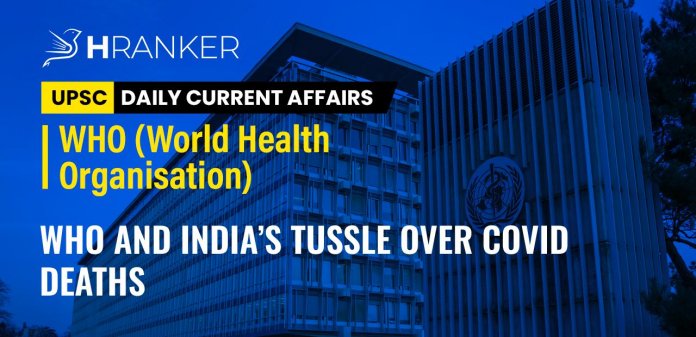WHAT’S IN NEWS:
India has raised objections to methodology used by WHO to compute excess deaths while WHO has reiterated its stance declaring India’s objections as incorrect.
- EXCESS MORTALITY: It is the difference between the total number of people who died during the pandemic and the number of people who’re expected to die based on historical data on mortality.
- COVARIATES: These are independent variables with a positive or negative relationship with Global Burden of Diseases (GBD) diseases and conditions, are used to inform the estimation process in models in all components and stages of GBD study. Types of covariates include socioeconomic, demographic, health system access, climate and food consumption.
INDIA’S OBJECTIONS:
- India’s basic objections has not been with the results rather the methodology adopted for the same.
- WHO’s method divides countries into Tier-1 and Tier-2 (which includes India); it then uses a mathematical modelling process that extrapolates mortality figures directly obtained from Tier-1 countries for Tier-2 countries.
- India objects that this model doesn’t capture ground realities for a country of its geographical size and population, hence rejecting one size fits all approach.
- India objects that the data used by who from 18 Indian states regarding mortality figures is unverified and is therefore unreliable.
- India also objects to using global covariates such as monthly temperature and monthly average deaths, income etc. because it is very insignificant for a country like India with this vast latitudinal longitudinal extent / geographic expansion and economic variations.
WHO’S RESPONSE:
- WHO states that the data for India was sourced from the registered numbers of death and Union Territory levels that was either reported directly by the states through official reports and automatic vital registrations or by journalists who obtained death registration information through RTI (Right to Information) requests.
- WHO stresses that for India the global predictive covariate model is not used and the estimates of ‘Excess Mortality’ are based on data from India only.
ARGUMENT SUPPORTING WHO’S RESPONSE:
- Global studies, which are scientifically peer received, such as SCIENCE, estimated that the true number of people died in India exceeded three million; LANCET reports that even three million is an under-estimate and the total number of excess deaths was four million.
- India is apparently the only country to push back WHO estimates based on science
- A country like India with far weaker health systems can’t be miraculously less affected as compared to its much-advanced counterparts.
CONCLUSION
The need is for the truth to be acknowledged is the spirit of transparency, accountability and rebuilding trust between the state, scientific community and people. In that direction, India should Commission a team of experts, supply them with the best available data and have them independently investigate access death publishing their methods and numbers without fear or favor in reputed journals. This will help in analyzing our health infrastructure and better India’s image globally.




